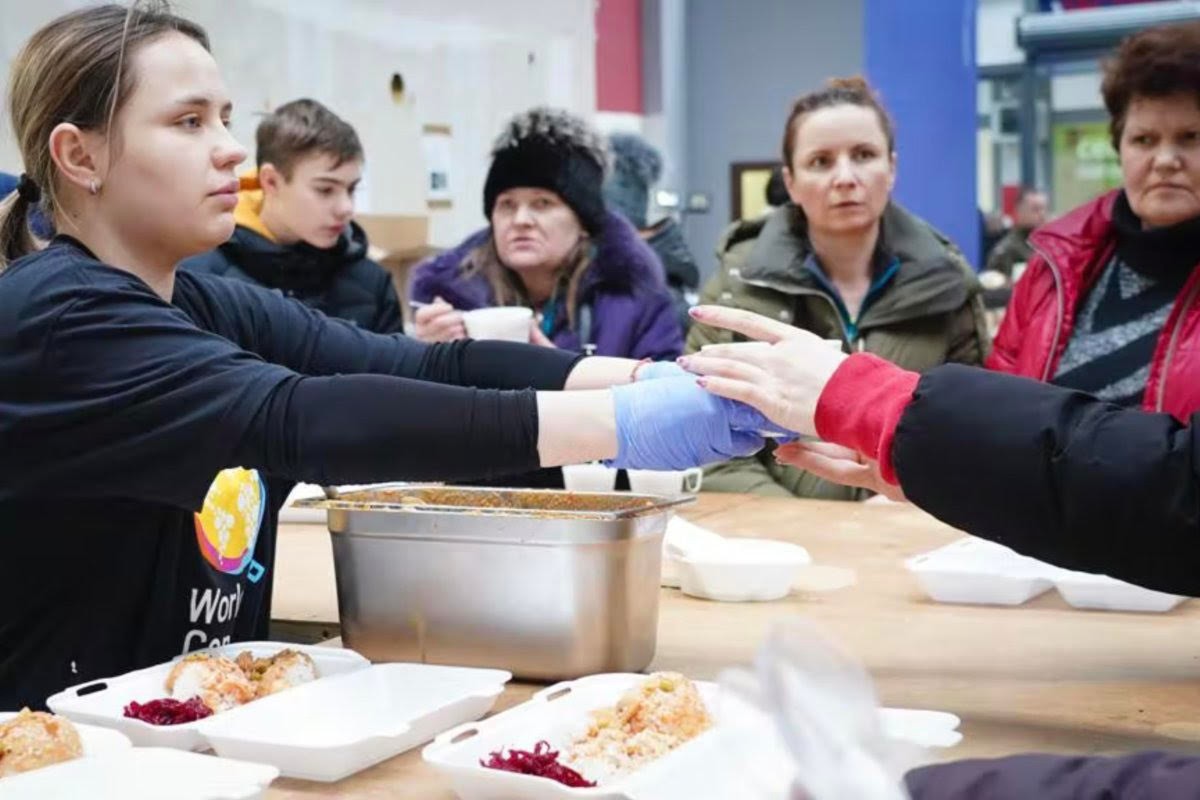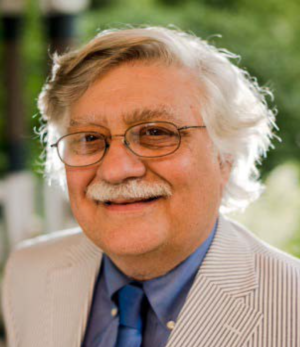War and Displacement: Caring for Ukrainian Women and Children Lecture Series
Mission
The MGH Harvard Program in Refugee Trauma (HPRT) and the Chester M. Pierce, MD, Division of Global Psychiatry through the production of the MGH Psychiatry Academy is presenting a series of expert lectures to assist Ukrainian healthcare workers, primarily primary care practitioners, doctors and nurses, psychologists, teachers.
We know the conditions for women and children are horrendous not only due to violence but the attacks on the water, food and energy systems and infrastructure of all areas of Ukraine.
The lectures will focus on the challenges facing health care practitioners and others working with Ukrainian women and children and families who have been displaced in Ukraine or are refugees displaced to another country.
 Photo courtesy of World Central Kitchen/wck.org
Photo courtesy of World Central Kitchen/wck.orgThe lectures which are designed to support the mental health care and wellness for this population displaced by violence, focuses on 3 levels:
- Living with ongoing war violence and witnessing war crimes
- Experiencing displacement while in Ukraine
- Being a refugee in another country.
The video lectures are brief, easy to understand, presented in English and Ukrainian and available online so that you can view them at your convenience. They are free for your use and can be used nationally and internationally. We hope you will find the information provided in these videos to be of some help in your quest for the knowledge you can use to promote wellness as best you can among your fellow Ukrainians at this time of great suffering.
We would like to thank our generous donors, Vistagen, Divaria Productions, the Mass. General Brigham Innovation Operations and Analytics team and our supporters at Proxet and Insight which is MGB’s research administration platform, as well as our other generous contributors, for providing the funding to make this lecture series possible.
Please contact the MGH Psychiatry Academy at (866) 644-7792 if you have any questions.
The lecture series consists of the following 12 segments:
1. OVERVIEW: Richard Mollica, MD and Gregory Fricchione, MD
explain what topics will be covered in the individual lectures
2. CARE FOR FAMILIES AND CHILDREN: Wendi Waits, MD
addresses how women, children, and families can cope with the violence happening around them every day.
3. TOXIC STRESS AND ATTACHMENT THEORY: THE NEUROPSYCHIATRIC CHALLENGE OF WAR: Gregory Fricchione, MD
addresses this in general and with a focus on women and children.
4. THE REFUGEE EXPERIENCE AND ITS IMPACT ON WOMEN AND CHILDREN: Elizabeth Levey, MD
focuses on pregnant women, mothers, and children in a war zone.
5. THE REFUGEE EXPERIENCE/HPRT Refugee Pocket Card: Richard Mollica, MD and Fanny Cai
introduce HPRT's Refugee Pocket Card for Caregivers
6. CHILDHOOD MENTAL HEALTH PROBLEMS: Mark Alexakos, MD
addresses common mental health problems of children and interventions /referrals for severe disorders (e.g., suicidality)
7. THE ECOLOGICAL MODEL OF COMMUNITY CARE: Giuseppe Raviola, MD, MPH
addresses the ecological model of care with a focus on family and community strengthening.
8. SELF CARE FOR THOSE WORKING WITH DISPLACED PERSONS AND REFUGEES IN UKRAINE: Eugene Augusterfer, MSW
reviews the Harvard Program in Refugee Trauma (HPRT) Self-care model and Self-care Pocket Cards.
9. MENTAL HEALTH SCREENING: Rebecca Hock, PhD
reviews the major simple screens for children and adolescents.
10. THE TRAUMA STORY: Richard Mollica, MD, MA
reviews the role of the trauma story in the care of trauma.
11. STRESS OF WAR ON UKRAINIAN SOLDIERS: Oleh Hukovskyy (Ukraine)
discusses the stress of the war on Ukrainian soldiers fighting for their families and their country
12. CONCLUDING REMARKS: Valentina Bronkema (Ukraine)
reviews the important use of this lecture series.
MEET OUR PRESENTERS
Course Directors:
Eugene Augusterfer, LCSW
Eugene F. Augusterfer, LCSW, is Deputy Director and Director of Telemedicine at the Harvard Program in Refugee Trauma and the Harvard Global Mental Health Program
As a senior faculty member of the Harvard Global Mental Health Team, he has focused on design and development of sustainable mental healthcare through the use of telemedicine.
He is a mental health subject matter expert at Vanderbilt University’s National Center for Emergency Preparedness, and he has been a guest lecturer at Georgetown University School of Public Health. He co-founded and co-led the World Bank Mental Health and Psychosocial Working Group. He has been a consultant/advisor to global senior executive leadership at the World Economic Forum, the United Nations Development Programme and with executives in the healthcare/mental health industry. In the field of telemedicine, he has served as the Chair of the American Telemedicine Association Mental Health Special Interest Group, and he served as a subject matter expert on the development and implementation of the U.S. Air Force telemedicine program. Additionally, he is a former U.S. Air Force Mental Health Officer.

Gregory Fricchione, MD
Gregory Fricchione, MD, is Associate Chief of Psychiatry, Director of the Benson-Henry Institute for Mind Body Medicine and of the Chester Pierce Division of Global Psychiatry and Co-Director of the McCance Center for Brain Health in the Department of Neurology at Mass General Hospital and the Mind Body Medicine Professor of Psychiatry at Harvard Medical School.
He specializes in neuropsychiatry and psychosomatic medicine and for 40 yers has helped care for patients with severe medical, neurological and surgical illnesses. He has published more than 230 peer reviewed publications has authored or co-authored 6 books. He is also the medical editor of the 2020 Harvard Medical School Special Report on Stress Management. His research interests include study of the catatonic syndrome, the neurophysiology of stress and resilience and how the comparative neurology of brain evolution illuminates our concepts of health and illness and medical caregiving.

Richard Mollica, MD, MAR
Dr. Mollica is a Professor of Psychiatry at Harvard Medical School and Director of the Harvard Program in Refugee Trauma (HPRT) at Massachusetts General Hospital.
Since 1981, Dr. Mollica and HPRT have pioneered the medical and mental health care of survivors of mass violence and torture in the U.S. and abroad. Under Mollica’s direction, HPRT conducts clinical, training, policy, and research activities for populations affected by mass violence around the world. Dr. Mollica is currently active in clinical work, research, and the development of a Global Mental Health curriculum, focusing on trauma and recovery. The Global Mental Health: Trauma and Recovery certificate program is the first of its kind in global mental health and post- conflict/disaster care. He has published over 160 scientific manuscripts, published his first book called Healing Invisible Wounds: Paths to Hope and Recovery in a Violent World (2006), and his most recent published book is A Manifesto: Healing a Violent World (2018).

PRESENTERS:
Mark Alexakos, MD
Chief Behavioral Health Officer at Lynn Community Health Center
Valentina Bronkema
MGH-Harvard Program in Refugee Trauma Ukrainian Center, Khmelnitsky region
Fanny Cai
Research and Program Coordinator for Harvard Program in Refugee Trauma
Rebecca S. Hock, Ph.D.
Assistant Professor of Global Health, Duke Kunshan University
Faculty Member of the Duke Global Health Institute, Duke University
Oleh Hukovskky
Ukrainian Military Soldier/Psychiatrist
Elizabeth Levey, MD
Assistant Professor of Psychiatry at Harvard Medical School
Psychiatrist at Massachusetts General Hospital
Giuseppe Raviola, MD, MPH
Associate Director of the Chester M. Pierce, MGH Division of Global Psychiatry
Director of the Program in Global Mental Health and Social Change at Harvard Medical School
Director of Mental Health for Partners In Health (PIH)
Wendi Waits, MD
US Military Psychiatrist, Retired
PRESENTATIONS
<strong>1. Overview:</strong> Richard Mollica, MD and Gregory Fricchione. MD
2. Care for Families and Children: Wendi Waits, MD
3. Toxic Stress and Attachment Theory: The Neuropsychiatric Challenge of War: Gregory Fricchione, MD
4. The Refugee Experience and its impact on women and children: Elizabeth Levey, MD
<strong>5. The Refugee Experience/HPRT Refugee Pocket Card:</strong> Richard Mollica, MD and Fanny Cai
6. When More Help is Needed for Children of War: Mark Alexakos, MD
7. The Ecological Model of Community Care: Giuseppe Raviola, MD, MPH
8. Self Care for Those Working with Displaced Persons and Refugees in Ukraine: Eugene Augusterfer, LCSW
9. Mental Health Screening: Rebecca S. Hock, Ph.D.
10. Listening to the Trauma Story: Richard Mollica, MD, MAR
11. Stress of War on Ukrainian Soldiers – Oleh Hukovskyy, Ukrainian Military Psychiatrist
12. Concluding Remarks: Valentina Bronkema
RESOURCES
- HPRT Self Care Protocol
- Combat Stress Reactions
- Integrative Adaptive Therapy
- HPRT: Trauma Story
- Delivering mental health and psychosocial support interventions to women and children in conflict settings: a systematic review, BMJ Global Health, 10.1136/bmjgh-2019-002014
- 2020 Harvard Stress Management Report
Evaluation
Thank you so much for watching our lecture series. We hope you found the presentations helpful. Please fill out the following evaluation.

